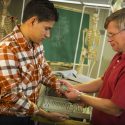PEOPLE expands its reach to Madison elementary school ranks
UW–Madison’s influential PEOPLE program, which has helped prepare hundreds of Wisconsin students of color for college admission, is now reaching into the elementary grades to help a new generation look to the future.
The idea began with a discussion between UW–Madison Provost Peter Spear and the Rev. Carmen Porco, who directs the Northport and Packers Community Learning Centers on Madison’s north side. “Peter asked if [the university] was involved in our centers,” says Porco. “I said no and he asked, ‘Why not?'”
That conversation led to a new partnership between the university and Madison’s north side residents, called the Pre-College Enrichment Opportunity Program for Learning Excellence (PEOPLE) Prep program.
“It gives the university a very direct relationship with this community and facilitates greater access of our kids and families to the university,” Porco says.
PEOPLE began in 1999 to help prepare and motivate high school students of color for the many academic skills needed for college. Since its inaugural year, 92 percent of PEOPLE’s 253 participants have gone on to college and more than half have attended UW–Madison.
PEOPLE has expanded over the years to include middle school students. But this fall, PEOPLE Prep marks the program’s first formal venture into the elementary grades, and 51 students – some as young as second grade – are already enrolled.
“It’s never too early to start with children and to think about their future and what they need to do to prepare,” says Walter Lane, assistant dean and director of PEOPLE. “Every child has the ability to create their own future. I think pre-college programs can show them the road to their future.”
The PEOPLE Prep program runs after school for two hours, two days a week at both Northport and Packers centers. The academic focus of PEOPLE Prep is reading, writing and mathematics, but the socialization that takes place is equally important.
Tutors, who are elementary education students at UW–Madison, help the children with their homework, play games and work in small groups. Mentors, who are PEOPLE and POSSE scholars from the university, visit students at the centers, but also communicate via pen pal letters and see the students on campus visits.
Key people involved in the program’s development include Porco, Lane, Packers program coordinator Jacki Thomas and Northport program coordinator Pat Steele. Lane also enlisted UW–Madison graduate students Tiffany Davis-Baer and Marla Delgado to help run the day-to-day operations of PEOPLE Prep.
Davis-Baer, a former second grade teacher in the Madison School District, works closely with the schools in creating PEOPLE Prep’s curriculum. Delgado, a graduate student in counseling psychology, works with the families and matches children with their mentors.
“It’s important that the students are able to interact with mentors from similar backgrounds,” Lane says. “The mentors went through the PEOPLE program and are wonderful role models for these students.”
Not only do the elementary school students benefit from having mentors, but the mentors benefit from engaging themselves in the community.
“It’s really important for the mentors to have that sense of giving back to the community,” Delgado says. “They’ve been afforded many opportunities. I think it is their responsibility to give back to the community and I think they realize that.”
UW–Madison freshman Shanee McCoy came through the PEOPLE program and is now helping PEOPLE Prep as the lead tutor. McCoy recalled a special moment when the students were reading a story. When asked about the story’s theme, a student responded: “Perseverance.”
“Today’s youth know perseverance and they know it when they see it,” McCoy says. “The PEOPLE program helps students see that and gain that.”
The program also helps those involved visualize new realities, encouraging them to take a step out of their comfort zone. PEOPLE Prep tutors are typically juniors in their first semester of elementary education and are participating in their first practicum, which places them in an after-school program. Next semester, the tutors will start a practicum within the regular system setting. Davis-Baer says it’s important for these tutors to see children in an alternative educational setting.
“I feel that so many children are kicked out of their classrooms because they’re having issues with behavior,” Davis-Baer says. “These are well-behaved children who, when they’re given attention and activities that make sense to them, do meaningful work and listen.”
“Kids can teach us many things,” Porco adds. “We just need to give them the opportunity.”
PEOPLE Prep looks to do exactly that by giving students the opportunity to tour campus, write to college-aged mentors, refine their skills in reading, writing and mathematics, and socialize with peers and tutors. These are all basic ingredients for later success in college.
“It’s a three-way partnership,” Delgado says. “You have the PEOPLE program, including the University and Northport and Packer centers as one corner. In another corner are the families and, finally, the schools. We’re all working together to give the child as many opportunities as we can.”
Adds Porco: “The association [with the university] is uplifting because it portrays a great sense of hope. Parents see that their children may have a good chance in life.”

